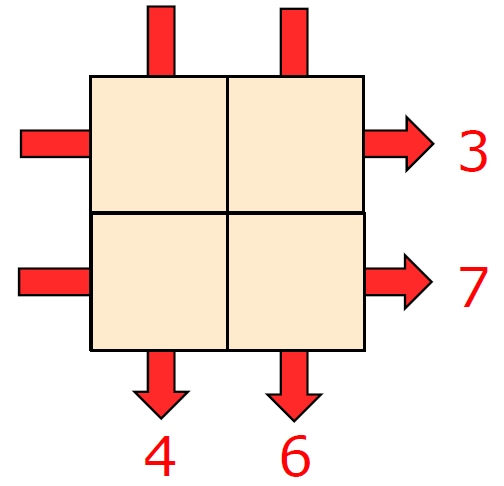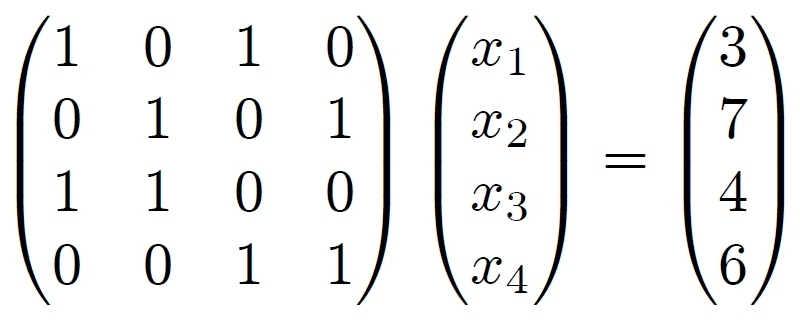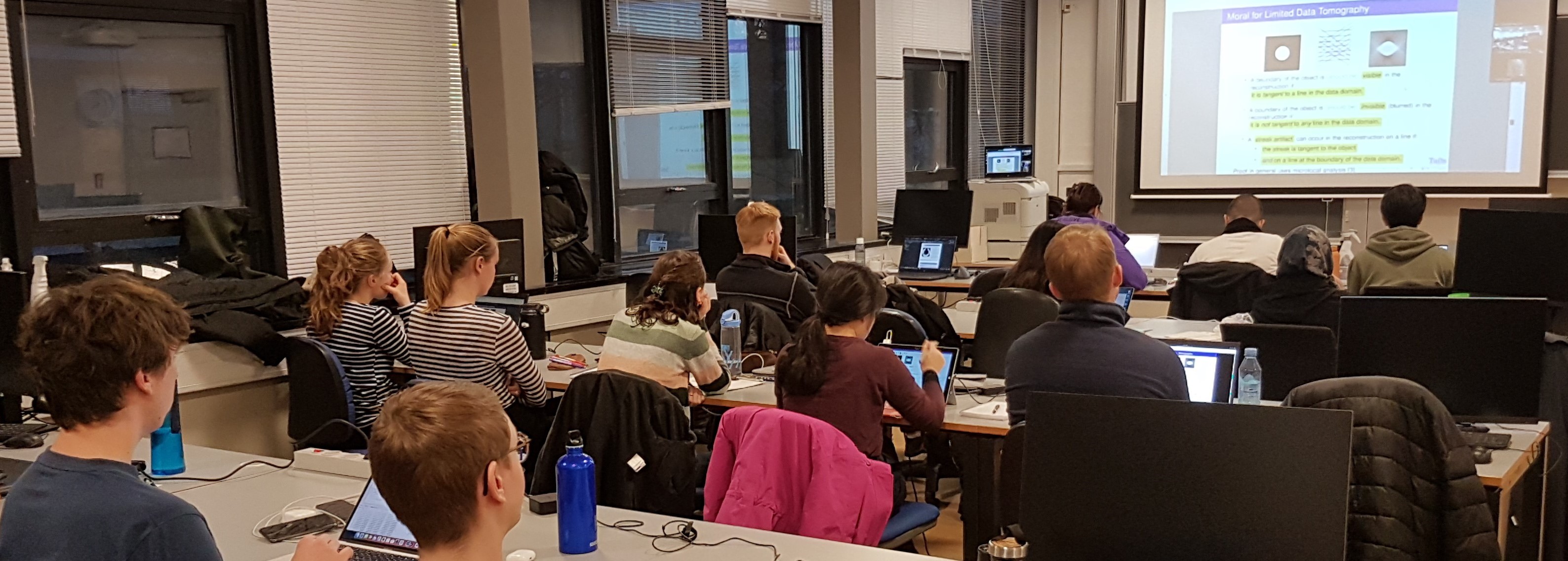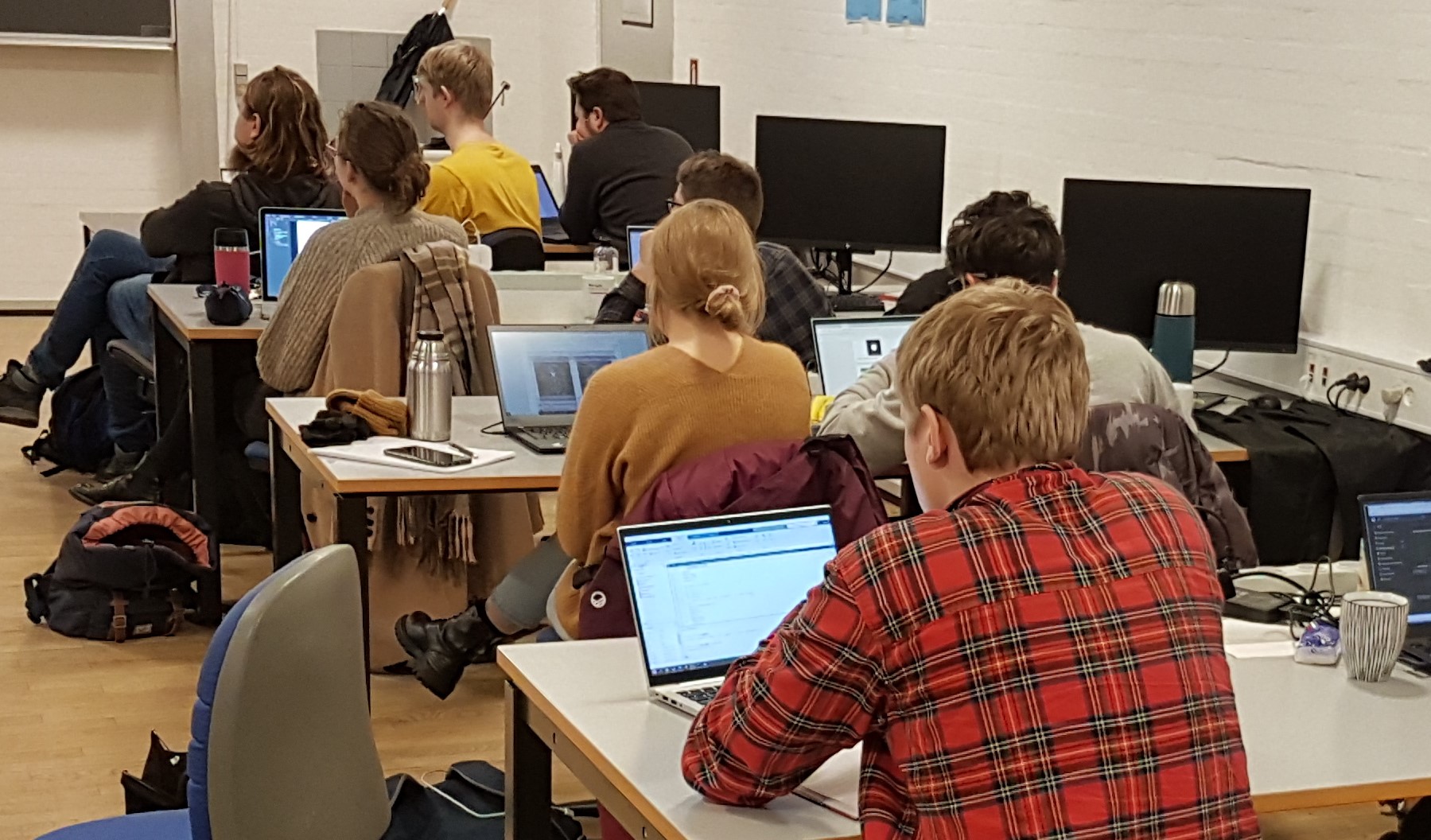PhD Course and Training School:
Scientific Computing for X-Ray Computed Tomography (CT)

|
Three modules in three weeks of January 2-20, 2023.
All lectures and exercises take place on DTU, Lyngby campus,
in building 308 room 109.
It is not possible to participate online.
|

|
Course Description
X-Ray Computed Tomography (CT) is a well-known technology that is used
routinely in medicine, materials science and many other applications.
We probe an object with X-rays and record the response from the object;
then using a mathematical model for the interaction between the X-rays
and the object, we can reconstruct the object's interior using
sophisticated mathematical methods and numerical algorithms.
This training school is aimed at participants who are interested in the
formulation, implementation, and use of standard reconstruction methods for
CT such as Filtered Back Projection and Algebraic Reconstruction Methods,
as well as more novel methods such as Total Variation.
We give a rigorous mathematical description of the CT reconstruction problem,
the associated mathematical formulations,
and the underlying computational algorithms - supplemented with
hands-on MATLAB®
computer exercises that illustrate these methods.
The goal is that the participants will get a basic understanding of
the formulation, implementation, and use of basic CT
reconstruction algorithms,
and thus be able to use them to perform data analysis
for their own CT problems.
The participants are expected to be familiar with MATLAB and with
basic aspects of linear algebra and optimization,
and they must bring their own laptop, preferably with MATLAB.
For participants without a license we provide access to
MATLAB on our servers (you must still bring a laptop).
The course is divided into three stand-alone modules, each of
one week, which can be followed independently. Each module
will finish with presentation of
a micro-project on the last day (Friday); there will
be time every day to work on the micro-project.
Course responsible:
Senior Researcher Jakob Sauer Jørgensen, DTU Compute,
homepage.




Participation in the Course
Students and PhD students from DTU must follow this course
over all three weeks as the
DTU-course 02946
(link to DTU's course description).
Other participants register for the course by sending a mail to
senior researcher Jakob Sauer Jørgensen
jakj@dtu.dk
indicating which week(s) you wish to attend.
There is no course fee.
Practical Details.
All lectures and exercises take place
on DTU
Lyngby Campus.
There is a lot of construction work going on, so make sure that you
check the
information
about the campus.
Here is information about
getting to DTU Lyngby Campus.
We start each day at 9 am and continue to about 4:30 pm, with
several breaks each day.
Requirements for passing the course are active participation in the
daily exercises and micro-projects and a short oral presentation
each Friday afternoon (by the group) of the micro-projects.
Participants
must arrange travel and accommodation themselves.
The course material consists of our slides and exercises,
which are uploaded here.
As supplementary course material
we recommend the book P. C. Hansen, J. S.
Jørgnsen, and W. R. B. Lionheart (Eds.), Computed Tomography:
Algorithms, Insight, and Just Enough Theory, SIAM,
Philadelphia, 2021,
Fundamentals of Algorithms
FA18.
Buying the book is not required.
For many of the exercises you will need MATLAB's Image Processing Toolbox,
as well as our software package
AIR Tools II.
You will also need a few m-files available here:
github.com/jakobsj/FA18.
Moreover, you will need access to a python compiler and the open-source
Core Imaging Library (CIL)
software package.
For more background material about X-ray CT,
the underlying physics, medical applications, etc. we recommend the
following books):
- T.M. Buzug, Computed Tomography, Springer, 2008.
(Available online to DTU students.)
- A.C. Kak and M. Slaney, Principles of Computerized Tomograhpic
Imaging, reprinted by SIAM, 2001.
Free online version.
- J.L. Prince and J.M. Links, Medical Imaging - Signals and
Systems, 2. Ed., Pearson, 2015.
Module 1 (Jan. 2-6): CT Problems, Filtered Back Projection,
SVD Analysis
Per Christian Hansen and
Jakob Sauer Jørgensen,
both from DTU Compute.
Course plan:
- Monday
- Introduction to X-ray CT
- The forward problem: the Radon transform and Lambert-Beer's law
- Reconstruction by Filtered Back Projection
- Introduction to the micro-project and micro-CT scanners
- 1 PM: CT measurements at DTU's Imaging
Center
- Tuesday
- Reconstruction using a real data.
- Wednesday
- Singular values and singular functions.
- The Picard condition.
- Discretization of the CT problem.
- Limited-data tomography - lecture by
Prof. Todd Quinto,
Tufts University; starts 3:00 pm.
- Thursday
- The singular value decomposition (SVD) of a matrix.
- SVD analysis.
- Friday
- Micro-projet work and presentations.
Course material:
- Slides
- Exercises
- The Radon Transform and the Filtered Back-Projection Algorithm.
- Singular values and functions: sorry, no exercises.
- Discretization and the system matrix: Exercises 9.1, 9.2, 9.3, 9.4.
- The Role of The Singular Value Decomposition: Exercises
10.1, (10.2 optional), 10.3, 10.4, 10.5, 10.6.
- Files:
ExWeek1Days1and2.pdf,
Ex9.pdf,
Ex10.pdf,
ExLimData.pdf
- Data for limited-data exercise: DataWeek1Days1and2.zip
(197 MB file).
- Micro-project
Module 2 (Jan. 9-13): Algebraic Iterative Reconstruction Methods
Per Christian Hansen and
Jakob Sauer Jørgensen,
both from DTU Compute.
Course plan:
- Monday
- A bit of linear algebra and matrix notation.
- Kaczmarz's and Cimmino's methods.
- Least squares problems.
- Introduction to micro-project.
- Tuesday
- Noisy data and semi-convergence.
- SVD analysis - iteration error and noise error.
- Stopping rules.
- Wednesday
- Algebraic iterative reconstruction in the Core Imaging Library (CIL)
- Real-data reconstruction with CIL
- Time for micro-project
- Thursday
- Advanced topics in CIL
- Time for micro-project
- Friday
- Micro-project work and presentations.
Course material:
- Slides
- Exercises
-
Algebraic Methods for CT: Exercises 11.1, 11.2, 11.3 11.4, 11.5, 11.6,
11.8, 11.9, 11.10, 11.11 - that is a lot, so feel free to prioritize.
-
Noisy Data and Semi-Convergence: 11.12, 11.14, 11.15,
(11.16 optional)
- Stopping rules: no exercises, it is part of micro-project B.
- Files:
Ex11.pdf
- Micro-project
Module 3 (Jan. 16-20): Optimization
Methods and Their Use in CT Reconstruction
Contents to be determined.
Course plan:
- Monday
- Gaussian and Poisson measurement models.
- Variational methods.
- Priors and regularization (Tikhonov, generalized Tikhonov).
- Introduction to micro-project.
- Tuesday
- Unconstrained optimization.
- Lipschitz continuity.
- Majorization minimization.
- Convexity.
- Step size rules and Stopping criteria.
- Power iteration.
- Wednesday
- Constrained optimization.
- Convex sets.
- Proximal gradient method.
- Optimality conditions.
- Accelerated proximal gradient methods.
- Smoothing techniques.
- Thursday
- Friday
- Micro-project work and presentations.
Course material:
- Slides
- Exercises
- Regularization: Exercises 12.1-12.8 (all of them).
- Optimization: Exercises 13.1-13.8 (all of them).
- Files:
Ex12.pdf,
Ex13.pdf
- Micro-project







